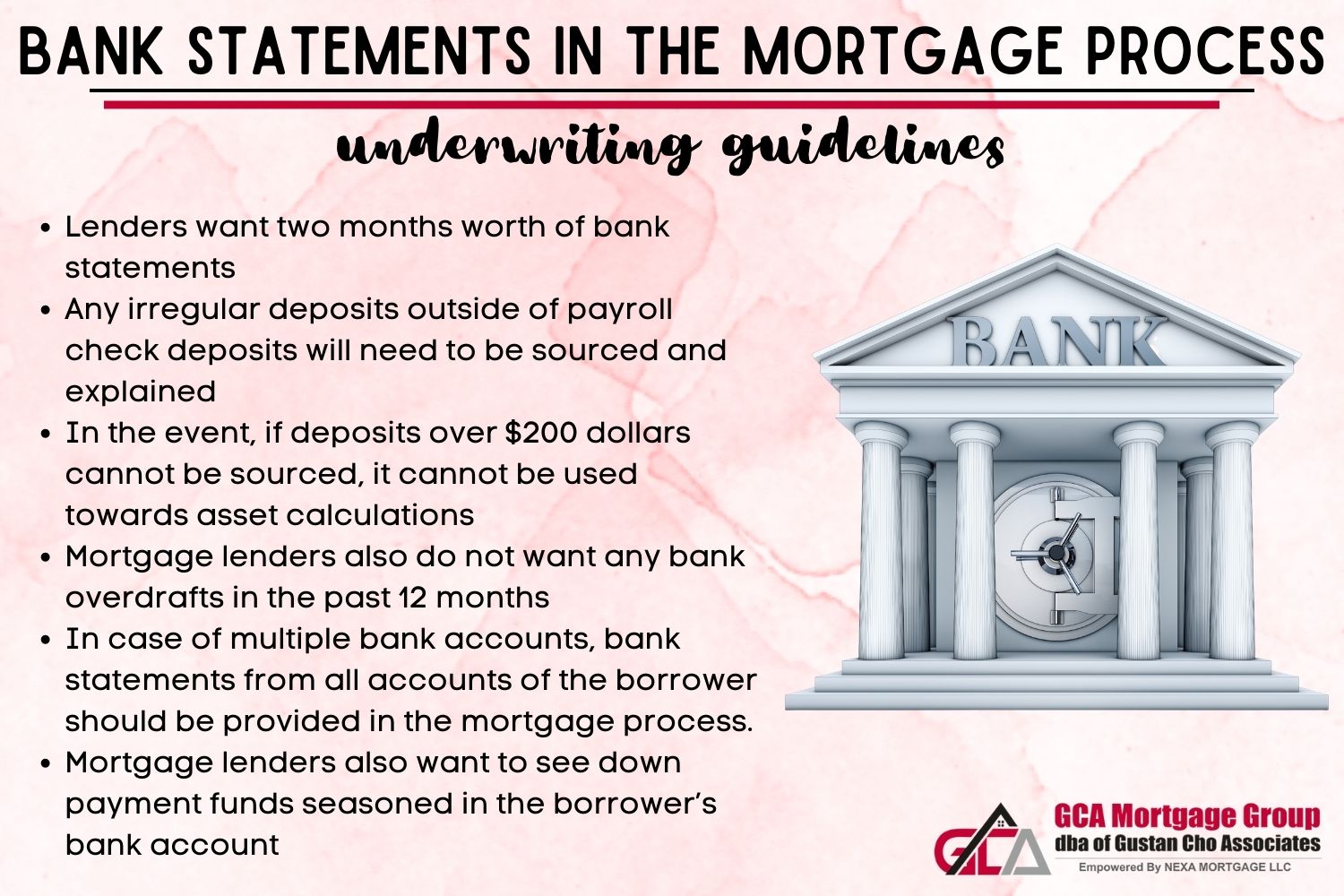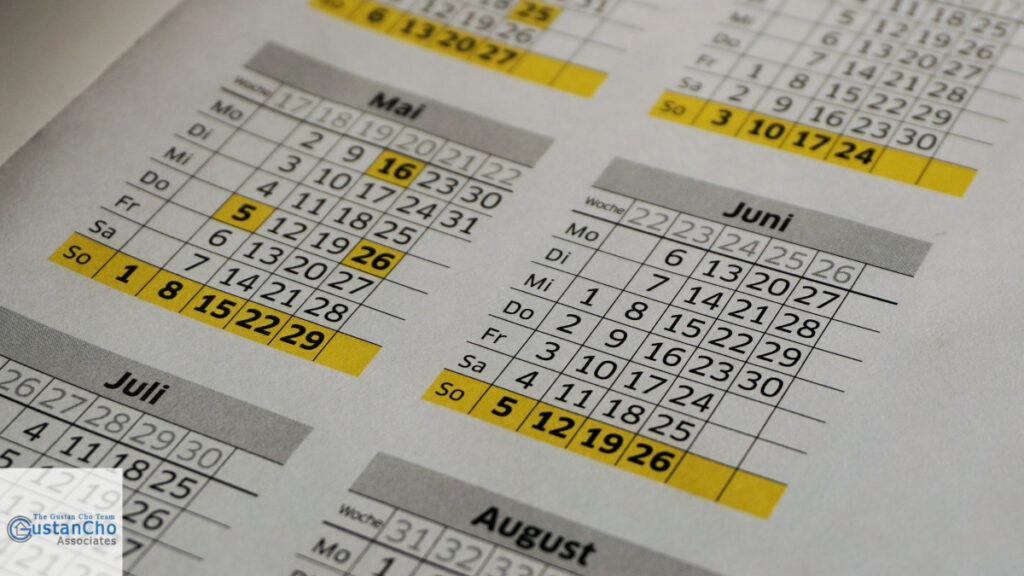Bank Statements In The Mortgage Process
In this guide, we will cover bank statements in the mortgage process. We will discuss how mortgage underwriters analyze bank statements of mortgage loan applicants.

The underwriter will thoroughly scrutinize bank statements during the mortgage process. Lenders want two months’ worth of bank statements. Any irregular deposits outside payroll check deposits must be sourced and explained. Angie Torres, the National Operations Director at Gustan Cho Associates, advises the following about qualified funds:
If deposits over 200 dollars cannot be sourced. It cannot be used for asset calculations.
Mortgage lenders also do not want bank overdrafts in the past 12 months. Even a 5 dollar overdraft can be a deal killer. All bank statements in the mortgage process must be used for borrowers with multiple bank accounts and transferring funds from one account to another. Mortgage lenders also want to see down-pay funds seasoned in the borrower’s bank account—the importance of bank statements during the mortgage process.
Irregular and Large Deposits In Bank Statements In The Mortgage Process
For borrowers with irregular deposits or large deposits showing in Bank Statements In The Mortgage Process, those irregular items need to be sourced. Underwriters will want proof of where the irregular or large deposit came from. The source needs to be provided
Regular deposits like payroll checks can easily be explained. But extraordinary deposits need to be explained, and proof needs to be provided. For example, if there is a large deposit from the sale of a car, borrowers need to provide the bill sale, a copy of the check, and a copy of the deposit slip plus a letter of explanation
If borrowers are getting a gift for the down payment, they must provide a gift letter from the donor. The gift letter, provided by the lender, will state that the gift is only a gift and does not need to be paid back. The paper trail of gift funds transferring from the donor’s account into the borrower’s account must be provided. Also, a 30-day bank statement from the donor showing that the funds have been seasoned needs to be provided to the lender. Remember, lenders only require to see 60 days’ worth of bank statements.
Funds That Cannot Be Sourced
Some borrowers have mattress money ( cash in hand ). Cash is non-existent in the mortgage business. However, they can deposit cash in their bank account and let that cash season for at least 60 days. Borrowers who let cash season for 60 days in their bank account can use the cash towards their down payment on their home purchase.
Lenders will not ask questions about bank balances for longer than 60 days. Undocumented cash is nonexistent in the mortgage business and cannot be used for mortgage qualification. Marga Jurilla, GCAs Branch Operations Manager, advises on how to be able to use unseasoned funds:
There is a solution for borrowers who have a substantial amount of cash and cannot source the cash. You must deposit cash in the bank account as soon as possible and wait 60 days.
After cash has been seasoned in the bank account for 60 days, sourcing it is unnecessary since mortgage lenders only require 60 days of bank statements. Same with a gift from a donor. If the gift funds have been given to the borrower and 60 days have elapsed, no gift letter or sourcing is required.
What Happens If I Have Overdrafts In The Past 12 Months?
Mortgage lenders do not want to see any bank overdrafts in the past 12 months. Multiple bank overdrafts will be deal killers. For borrowers with one or two overdrafts who have a very good excuse, maybe a detailed letter of explanation can cure the problem.
But overdrafts month after month will cause a mortgage denial in a heartbeat. Guaranteed!!!! Mortgage Underwriters view bank overdrafts as financial irresponsibility
Lenders take overdrafts extremely seriously. Lenders want only to see 60 days of bank statements.
Solutions To Overdrafts In The Past 12 Months
So if a person had an overdraft six months ago and the lender only wants to see two months’ bank statements, does that mean the borrower is clear? THE ANSWER IS A DEFINITE NO!!!! This is the reason. Angie Torres, the National Operations Director at Gustan Cho Associates, said the following about how underwriters find out whether or not you had overdrafts in the past 12 months with current bank statements:
When borrowers provide two months’ actual bank statements, a column will itemize YTD (year-to-date) overdrafts and overdraft fees.
If there is a number there, it will trigger a red flag, and the loan application will most likely be denied. So, if the borrower had overdrafts in the past 12 months, providing bank statements to the underwriter is out of the question. This is a don’t ask, don’t tell case scenario. On the mortgage application, lenders will not ask borrowers whether they had a bank overdraft in the last 12 months.
Bank Statements In The Mortgage Process: Printouts Versus Statements
If borrowers provide lenders with two months’ work of bank statement printouts and not actual bank statements, there is no overdraft or YTD overdraft section on most bank statement printouts. Bank statement printouts are allowed instead of bank statements. Borrowers need to go to their bank and see a teller.
Ask them to get you 60 days of bank statement printouts. Borrowers must get the printouts dated, signed, and stamped by the teller. As long as there are no overdraft fees or overdrafts on bank printouts, which most do not have, borrowers will be safe during the mortgage approval process. I strongly recommend that all consumers get overdraft protection on their bank accounts.
Qualifying For a Mortgage With a Lender With No Overlays
Borrowers who need to qualify for a home loan with a national mortgage broker licensed in 48 states, including Washington, DC, Puerto Rico, and the U.S. Virgin Islands, with no overlays, can contact us at Gustan Cho Associates at 800-900-8569. Text us for a faster response. Or email us at gcho@gustancho.com. The team at Gustan Cho Associates is available seven days a week, evenings, weekends, and holidays.










